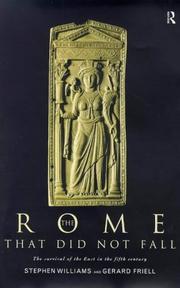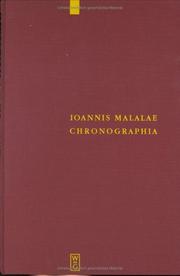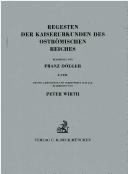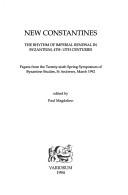| Listing 1 - 10 of 14 | << page >> |
Sort by
|
Book
ISBN: 9782970076315 2970076314 Year: 2011 Publisher: Geneva: La pomme d'or,
Abstract | Keywords | Export | Availability | Bookmark
 Loading...
Loading...Choose an application
- Reference Manager
- EndNote
- RefWorks (Direct export to RefWorks)
Book
ISBN: 9602500905 Year: 1994 Publisher: Athènes : Centre de recherches byzantines, F.N.R.S.,
Abstract | Keywords | Export | Availability | Bookmark
 Loading...
Loading...Choose an application
- Reference Manager
- EndNote
- RefWorks (Direct export to RefWorks)
Law, Byzantine --- Emperors --- Droit byzantin --- Empereurs byzantins --- Sources

ISBN: 0415154030 Year: 1999 Publisher: London ; New York Routledge
Abstract | Keywords | Export | Availability | Bookmark
 Loading...
Loading...Choose an application
- Reference Manager
- EndNote
- RefWorks (Direct export to RefWorks)
Emperors --- Empereurs --- Empereurs byzantins --- Byzantine Empire --- Rome --- Empire byzantin --- History --- Histoire --- Caesars --- Decennalia --- Roman emperors --- Byzantine emperors --- Europe --- To 527 --- Empire, 284-476 --- Germanic invasions, 3d-6th centuries
Book
ISSN: 17707609 ISBN: 9782916716466 2916716467 Year: 2014 Volume: 40 Publisher: Paris: Association des amis du Centre d'histoire et civilisation de Byzance,
Abstract | Keywords | Export | Availability | Bookmark
 Loading...
Loading...Choose an application
- Reference Manager
- EndNote
- RefWorks (Direct export to RefWorks)
On trouvera dans ce volume les premières traductions en français de l’Histoire de Léon le Diacre et de son Éloge de l’empereur Basile, ce dernier texte accompagné d’une nouvelle édition, la première ayant été procurée par I. Sykoutrès en 1933. Les introductions traitent principalement des rapports entre rhétorique et histoire à Byzance. L’Eloge a été prononcé en 989 ou 990 en présence de l’empereur Basile II par ce membre du clergé impérial, alors âgé de 40 ans. L’Histoire en X livres s’étend de la dernière année de règne de Romain II [959] à la treizième année de celui de Basile II [989]. Les auteurs ont profité de l’identité des événements rapportés par Léon le Diacre [Xe siècle] et Jean Skylitzès [XIIe siècle] pour illustrer la traduction de l’Histoire de Léon par un grand nombre des XIIe siècle]. Trois autres miniatures empruntées à la Chronique de Radziwill [XVe siècle] rehaussent les hauts faits de Svjatoslav rapportés par Léon au IXe livre de son Histoire.
Byzantine Empire --- Emperors --- Rhetoric, Ancient. --- Greek philology. --- Illumination of books and manuscripts, Byzantine. --- History, Military --- Basil --- History --- Historiographie --- Moyen âge. --- Empereurs byzantins
Book

Year: 1991 Volume: 61,1 Publisher: Bruxelles : [Fondation byzantine],
Abstract | Keywords | Export | Availability | Bookmark
 Loading...
Loading...Choose an application
- Reference Manager
- EndNote
- RefWorks (Direct export to RefWorks)
Emperors --- Empereurs byzantins --- Congresses. --- Congrès --- Charlemagne, --- Leroy, Maurice, --- Europe --- Byzantine Empire --- Empire byzantin --- Kings and rulers --- History --- Congresses --- Rois et souverains --- Histoire
Book
ISBN: 9783110265903 3110265907 311026689X 1306429587 3110266881 Year: 2013 Volume: 44 Publisher: Berlin ; Boston De Gruyter
Abstract | Keywords | Export | Availability | Bookmark
 Loading...
Loading...Choose an application
- Reference Manager
- EndNote
- RefWorks (Direct export to RefWorks)
Zwischen 395 und 624 residierte der Kaiser des Ostens ununterbrochen in Konstantinopel. Er reiste nicht mehr durchs Reich, er führte keine Armee in den Krieg, er verließ die Stadt nicht weiter als eine Tagesreise. Konstantinopel war ohne das Kaisertum undenkbar, aber ebenso war der Herrscher auf die Stadt angewiesen. Ein römischer Kaiser konnte nämlich, anders als ein Erbmonarch der Neuzeit, Macht und Leben an einen Usurpator verlieren, seine Stellung blieb stets prekär. Daher mußte er immer wieder um die Unterstützung der Einwohner Konstantinopels werben, sie um jeden Preis behaupten - und manchmal doch erfahren, daß er sie verlor. Geschah das, war sein Sturz unvermeidlich. So war der Kaiser eingebettet in ein komplexes Netz sozialer Beziehungen. Er benötigte die Akzeptanz von Armee, Volk, Geistlichkeit und Eliten. Ihren Bedürfnissen kam er nach, indem er ihre Anliegen in der Sache befriedigte oder den Status der verschiedenen gesellschaftlichen Gruppen durch angemessenes rituelles, gestisches und verbales Handeln anerkannte. Das Buch analysiert diese Prozesse gesellschaftlicher Interaktion, es zeigt, wie der Kaiser Kaiser blieb. So entsteht ein neues Bild des soziopolitischen Systems Konstantinopels und des spätantiken Reiches insgesamt.
Emperors --- Empereurs byzantins --- Byzantine Empire --- Empire byzantin --- Kings and rulers --- History --- Civilization --- Politics and government --- Histoire --- Civilisation --- Politique et gouvernement --- Caesars --- Decennalia --- Roman emperors --- History. --- Byzantine Empire. --- Emperor. --- Late Antiquity. --- Political System. --- Roman Empire. --- Kings and rulers.

ISBN: 9783110088007 3110088002 3111882039 3110876019 Year: 2000 Volume: v. 35 Publisher: Berolini: de Gruyter,
Abstract | Keywords | Export | Availability | Bookmark
 Loading...
Loading...Choose an application
- Reference Manager
- EndNote
- RefWorks (Direct export to RefWorks)
Es handelt sich beim vorliegenden Werk um die kritische Edition der ältesten erhaltenen byzantinischen Weltchronik, der Chronographia des Ioannes Malalas (syrisch: Rhetor oder Rechtsgelehrter). Iohannes Malalas wurde um 490 n. Chr. in oder bei Antiochia geboren und starb um 570/580 n. Chr. Er schrieb seine Chronographia in zeitgenössischem umgangssprachlichem Griechisch. Die Ausgabe umfasst die Prolegomena, die Auskunft geben über die handschriftliche Überlieferung der Chronographia, die Textedition mit reichhaltigem apparatus fontium und minutiösem apparatus criticus, sowie die im CFHB vorgesehenen Indices. Die Edition ersetzt jene von Dindorf (1813 im Bonner Corpus). Sie bietet insofern einen vollständigeren Text als sie zum ersten Mal auch das erste Buch des Werkes enthält und die kirchenslavische Übersetzung des 10./11. Jhs., die einen vollständigeren Text bietet, in Rückübersetzung bei der Texterstellung heranzieht. This is the critical edition of the earliest extant Byzantine world chronicle, the Chronographia by Ioannes Malalas (Malalas' = Syrian for 'rhetor' or 'scholar'). Iohannes Malalas was born approximately in 490 in or near Antiochia and died approximately in 570/580. He wrote his chronicle in the contemporary colloquial Greek. The edition comprises the Prolegomena which give information about the handwritten tradition of the Chronographia, the edition of the text with a rich apparatus fontium and a precise apparatus criticus as well as the indices planned in the CFHB. The edition replaces that one of Dindorf (1813 in the corpus of Bonn). It offers a more complete text in so far as it contains for the first time the first book and uses the translation of the Slavic Church in the 10/11th century for the textual construction.
Empire byzantin --- Histoire --- Empereurs byzantins --- Thessalonike (Greece) --- Thessalonique (Grèce) --- Thessalonikē (Greece) --- Thessalonique (Grèce) --- Chronology, Historical. --- Histoire universelle --- Wereldgeschiedenis. --- World history --- Ouvrages avant 1800. --- Byzantine Empire --- History --- Sources. --- Emperors --- Sources --- Early works to 1800 --- Byzantine emperors


ISBN: 3406513514 3406007384 3406370209 9783406513510 9783406007385 9783406370205 Year: 1977 Volume: Abt. 1, T. 2 Publisher: München: Beck,
Abstract | Keywords | Export | Availability | Bookmark
 Loading...
Loading...Choose an application
- Reference Manager
- EndNote
- RefWorks (Direct export to RefWorks)
Byzantine Empire --- Empire byzantin --- History --- Sources --- Histoire --- 949.5 <093> --- 949.5 <093> Geschiedenis van Byzantium en Griekenland--Historische bronnen --- Geschiedenis van Byzantium en Griekenland--Historische bronnen --- Sources. --- Empereurs byzantins --- Regestes

ISBN: 0860784096 9780860784098 Year: 1994 Volume: 2 Publisher: Aldershot: Variorum,
Abstract | Keywords | Export | Availability | Bookmark
 Loading...
Loading...Choose an application
- Reference Manager
- EndNote
- RefWorks (Direct export to RefWorks)
Emperors --- Empereurs byzantins --- Congresses --- Congrès --- Byzantine Empire --- Empire byzantin --- History --- Histoire --- -Rulers --- Sovereigns --- Heads of state --- Kings and rulers --- Monarchy --- -Congresses --- -History --- Congresses. --- -Byzantine Empire --- Congrès --- Czars (Emperors) --- Rulers --- Tsars --- Tzars --- Byzantine Empire&delete& --- Byzantium (Empire) --- Vizantii︠a︡ --- Bajo Imperio --- Bizancjum --- Byzantinē Autokratoria --- Vyzantinon Kratos --- Vyzantinē Autokratoria --- Impero bizantino --- Bizantia --- Byzantine Empire&delete&&delete& --- Emperors - Byzantine Empire - Congresses
Book
ISBN: 9783643113931 9783643115409 3643113935 3643115407 Year: 2013 Volume: 3-4 Publisher: Berlin: Lit,
Abstract | Keywords | Export | Availability | Bookmark
 Loading...
Loading...Choose an application
- Reference Manager
- EndNote
- RefWorks (Direct export to RefWorks)
Die Funktion und der Stellenwert des Patriarchen im politischen Gefüge des byzantinischen Staatswesens standen im Mittelpunkt einer Tagung des Projekts B11 "Kaiser und Patriarch in Byzanz - eine spannungsreiche Beziehung" am Exzellenzcluster "Religion und Politik" der WWU Münster im November 2010. Die Beiträge reichen von der Spätantike bis zum Ausgang des byzantinischen Reiches und behandeln auch die Entwicklungen in Rom und Antiocheia.
Church and state --- Emperors --- Patriarchs and patriarchate --- Byzantine Empire --- Church history --- Politics and government --- Church and state - Byzantine Empire - Congresses --- Emperors - Byzantine Empire - Congresses --- Patriarchs and patriarchate - Byzantine Empire - Congresses --- Empereurs byzantins --- Constantinople --- Patriarches --- Byzantine Empire - Church history - Congresses --- Byzantine Empire - Politics and government - Congresses
| Listing 1 - 10 of 14 | << page >> |
Sort by
|

 Search
Search Feedback
Feedback About UniCat
About UniCat  Help
Help News
News